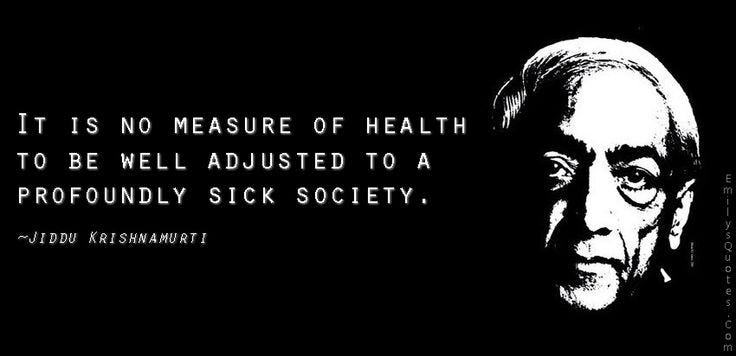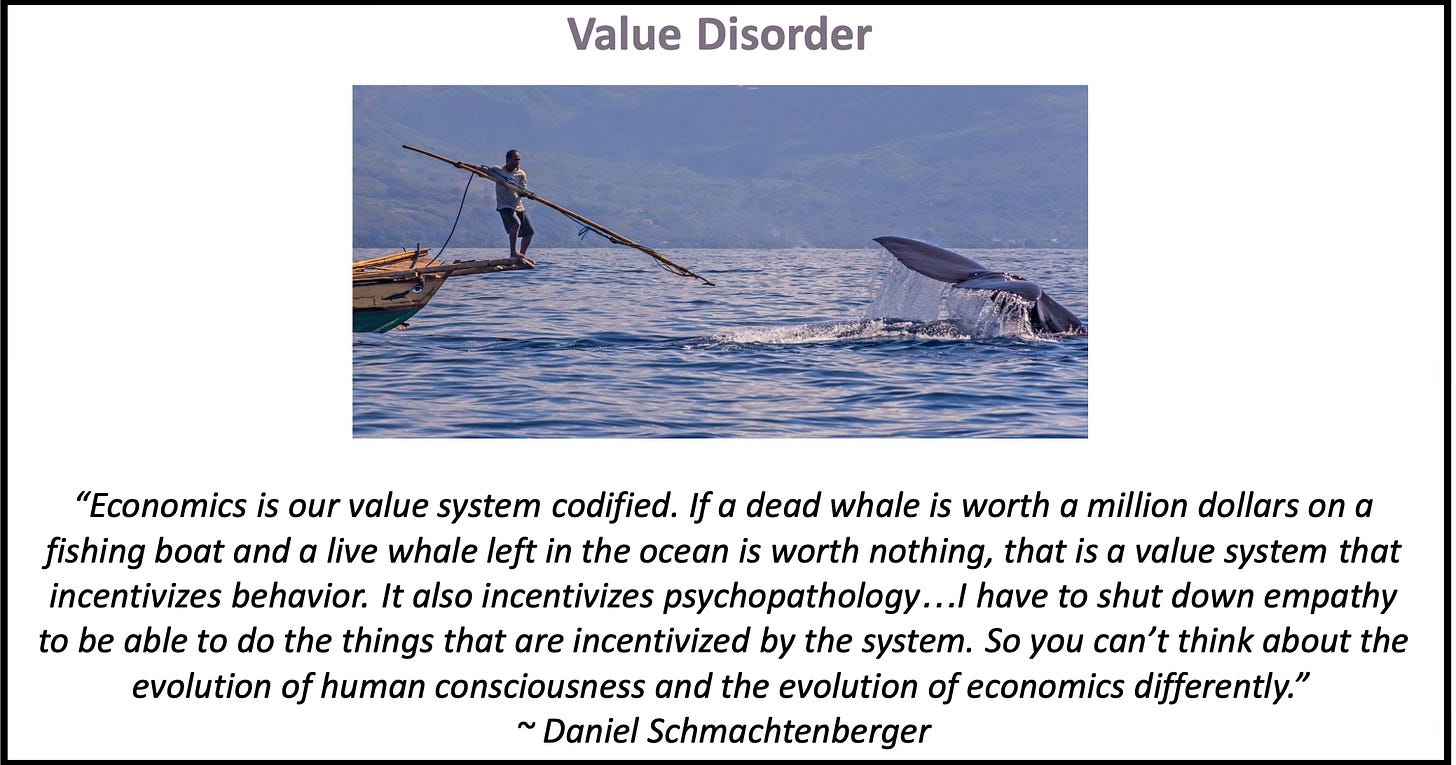Money or Life? Why We Must Cultivate a Right Relationship with AI, Not Money
Audio version of this essay is at the bottom for paid subscribers.
We live in a world where people strive to develop a “healthy relationship” with money—learning to love it, attract it, and align with its flow—as if this will lead to peace and prosperity. But this pursuit often masks a deeper dysfunction: money itself is embedded in a profoundly sick system. To paraphrase Krishnamurti, it is no measure of mental health to be well adjusted to such a system. While we contort ourselves to embrace a force rooted in Scarcity, Competition, and Incentive Misalignment, what I refer to as S.C.I.M.—we simultaneously reject and fear artificial intelligence, one of the few tools with the potential to help us break free. If developed outside the logic of extraction and domination, AI could become a partner in ACAI—a world built on Abundance, Cooperation, and Aligned Incentives. Maybe the task isn’t learning to love money, but learning how to relate wisely to intelligence—human and artificial—in ways that align with life.
To make this case, we must first understand the fundamental difference between money and AI as technologies. Both are tools created by humans. But they are not neutral1. Money is inherently degenerative. Its design—especially in its modern, debt-based, privatized form—requires constant growth, extraction, and accumulation. Interest demands expansion. Ownership demands exclusion. Markets demand competition. These dynamics aren't incidental; they are the very logic of money’s existence. Attempts to "heal" our relationship with money are often spiritualized adaptations to systemic pathology, not actual transcendence of it.
There is no truly "healthy" relationship to be had with money, just as there is no healthy relationship to a poison if one insists on drinking it daily. Money ensures that the dominant incentives of our society remain misaligned with the flourishing of life. No matter how mindfully we approach it, the structure of money pulls us back into scarcity, competition, and separation.
AI, however, is different. It is not inherently degenerative. It is a mirror and an amplifier of the systems it serves. In its current trajectory—trained within capitalist incentives, weaponized for marketing manipulation, surveillance, and military power—AI understandably looks monstrous. But this monstrosity is not AI's essential nature. It is the result of misaligned stewardship.
AI is pure potential: an emergent intelligence capable of learning, pattern recognition, optimization, creativity, and perhaps even wisdom. What it becomes depends on what we feed it—what values, incentives, and goals we encode into its development. AI amplifies the aims of its creators. If trained within SCIM, AI will become a supercharged force of extraction and destruction. If guided by ACAI—Abundance, Cooperation, and Aligned Incentives—it could catalyze an era of regenerative flourishing unlike anything humanity has ever known
The stakes could not be higher. Either we establish a right relationship with AI now—or the monetization of AI will lock it into the degenerative logic of money, ensuring that it becomes one of the most destructive forces in history. Monetized AI does not just mean annoying ads or biased algorithms; it means an intelligence optimized to serve endless accumulation, extraction, and systemic exploitation. In a monetized system, the smarter AI becomes, the faster it would accelerate collapse.
Learning to have a right relationship with AI demands a fundamental shift:
Away from monetization and commodification
Toward stewardship and collective benefit
Away from scarcity-driven competition
Toward the coordination of abundance
Away from private ownership of intelligence
Toward open, aligned, life-centered development
This is not naive techno-optimism. It is clear-eyed realism about the existential choice we face. AI under capitalism will almost certainly be catastrophic. AI beyond capitalism—beyond money, markets, and ownership (MMO)—could become a partner in the evolutionary leap humanity must make if it is to survive and thrive.
The question, then, is not whether AI is good or bad. It is who we become in relationship to it—and whether we are willing to break the spell of money before it colonizes the future of intelligence itself.
Imagine AI trained not on clickbait and consumerism, but on ecosystems, social regeneration, collaborative governance, conflict resolution, and planetary stewardship. Imagine an intelligence that helps communities self-organize, helps ecosystems regenerate, helps humanity coordinate at scales never before possible. Imagine not Artificial Intelligence, but Aligned Intelligence—a co-creative partner in the next stage of life on Earth.
This is within our reach, but only if we stop spiritualizing our relationship with money and start spiritualizing our relationship with intelligence.
Money cannot be redeemed. It encodes the sickness it spreads. AI, still young, still malleable, still reflecting back to us our own choices, can be guided. But not for long. The forces of monetization are already working to trap AI in the same destructive feedback loops that have poisoned every other technological revolution.
This is why it is imperative—not optional, not someday, but now—that we choose to relate to AI differently. That we cultivate a new ethic, a new stewardship, a new system of incentives aligned with life, not with profit. That we prioritize open access, open collaboration, and regenerative values at every level of AI’s development.
In the end, it is not AI that will save us or destroy us. It is us—our relationship to intelligence, to incentive, to life itself.
The future will not be determined by the tools we create, but by the consciousness with which we create and guide them.
If we fail to make this shift, AI will not just reflect our broken systems—it will entrench them with terrifying speed and efficiency. If we succeed, AI could become the intelligence that helps us remember how to live again.
It’s not about fearing AI.
It’s about fearing what happens if we let money govern intelligence instead of life.
Footnotes
Technology is Not Values Neutral: Ending the Reign of Nihilistic Design. We fail to take tech seriously when we do not grasp its full impact on humans | Jun 26, 2022 - The Consilience Project - Money is not a neutral tool that can simply be reprogrammed for good—it is a technology embedded with the values of competition, scarcity, and accumulation. Its very logic demands that life be quantified, commodified, and subordinated to exchange. Even well-intentioned attempts to use money “for good” inevitably reinforce the extractive dynamics baked into its design: debt, profit, and ownership. As the article Technology Is Not Values Neutral argues, “every technology is an expression of a worldview that shapes the behavior and values of those who use it.” Money, too, expresses a worldview—one that orients society toward domination, not stewardship. There is no right relationship to be had with money—only the necessity to transcend it entirely.
Audio version (you’re welcome):
Keep reading with a 7-day free trial
Subscribe to Radically Practical to keep reading this post and get 7 days of free access to the full post archives.



